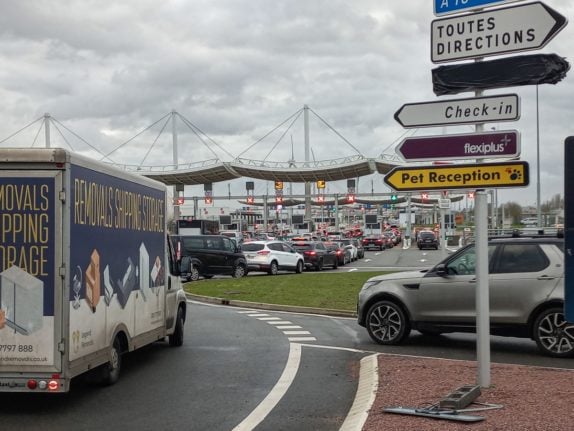Big changes are coming for travel in Europe with the launch of the EU’s new enhanced passport checks known as the Entry & Exit System (EES).
These include requiring passengers to give biometric details including fingerprints and a facial scan, and an automated passport scanning to keep track of time spent in the EU for those covered by the 90-day rule.
You can find a full explanation of the new system HERE.
But what does this all of this actually mean in practical terms for passengers? After looking at how EES will change travel on the Eurostar, cross-Channel ferries and airlines, we are looking at the system for Le Shuttle passengers, formerly known as Eurotunnel Le Shuttle.
Le Shuttle
This is the passenger service through the Channel Tunnel – freight traffic is dealt with differently – that sees car passengers being loaded onto a train and taken on the short 35-minute journey under the sea between Folkestone in the UK and Coquelles (near Calais) in France.
In 2022, Le Shuttle carried 2.1 passenger vehicles – including 100,000 over the summer months – and as with Eurostar, the majority of their passengers are British, 70 percent of them in fact.
So how will the new system work for Le Shuttle passengers?
Not all travellers will have to complete the EES registration – among those exempt are EU citizens (in the case of dual nationals, you must be travelling on your EU passport in order to benefit), non-EU citizens who are resident in the EU (with a residency card) or non-EU citizens who have a long-stay visa for an EU country – you can find a full list of exemptions HERE.
For those who are covered by EES – which includes British, American, Canadian and Australian tourists, second-home owners (who do not have visas) and visitors – the first time that you cross an external EU/Schengen border after the introduction of the system you will have to complete what is known as EES pre-registration.
This involves having your fingerprints and a facial scan taken, and completing a short questionnaire about your personal situation and travel plans. This only has to be done once and then remains valid for three years – for frequent travellers the registration renews itself every time you cross an EU/Schengen external border, so you should not need to re-register until you get a new passport.
On arrival at the terminal, drivers who need to complete these formalities will be directed to the pre-registration area.
This is a series of covered drive-through vehicle bays that can accommodate up to 60 vehicles at a time. Once in the bay, passengers will get out of the car and use the touch-screen kiosk to complete EES pre-registration.
The machine first scans your passport, then takes a facial scan and then invites you to place your hand on the scanner so that your fingerprints will be taken. Finally, passengers are required to complete a series of questions about their journey using the touchscreen.
The below video of a site visit by the EU’s EES director Agnès Diallo shows the kiosks and the driver area
Each passenger travelling in the car will be required to complete the formalities on the kiosk before the group returns to the car and then moves through the terminal to the next stage – passport control.
The terminals at Folkestone and Coquelles both have juxtaposed border control – which means that passengers departing the UK have their passports checked before departing by both French and British border control and then face no checks on arrival (and vice versa).
Passport control will be conducted in broadly the same way as pre-EES, with the exception that passports will also be scanned for entry and exit dates – to check whether people have exceeded their 90-day allowance in the EU.
What about exempt groups?
On arrival at the terminal, drivers should be given two options – go to the EES pre-registration area or go direct to passport control.
Those who can go straight to passport control should include; people who have already completed EES pre-registration on an earlier journey; EU citizens who are travelling on their EU passport; non-EU citizens who are resident in an EU country (with a residency card); non-EU citizens who have a long-stay visa for an EU country; people travelling on a diplomatic passport or similar (eg some NATO staff members).
On arrival at passport control you will need to present both your passport and evidence of your exemption – eg a residency card or visa.
Your passport should be checked in the same was as before EES started (that’s the theory anyway, although regular travellers will know that border guards are often confused about the situation for non-EU residents in the EU).
Will it be chaos?
There’s a lot of stress about this new system, with several delays already and repeated warnings of travel chaos when it comes into place, including from bosses at the Port of Dover and the French transport minister, who told reporters: “I fear problems.”
However Getlink, the company responsible for the operation of Le Shuttle, seems pretty chilled.
Yann Leriche, the chief executive of Getlink, told the BBC that travellers “will simply [get] out of their car, spend a few minutes on their kiosks, and go back to their car and continue their journey”.
He said it would take “five to seven minutes extra to get through”, but added “as we have extended the number of lanes, there will be no delay on the highway, nothing.
“It will happen in a very smooth manner”.
We’ll see.
But maybe it will be that smooth – Getlink benefits from the fact that the Folkestone and Coquelles terminals are big sites with room to expand – and they have used the extra space to create the huge new processing area for cars, the Coquelles site covers 7,000 square metres.
This is in contrast to the Port of Dover which has very little space to expand, and the Eurostar St Pancras terminal which is also in a cramped space (and has been forced to move the Benugo coffee shop in order to make room for the new terminals).
Getlink also appears to be well ahead with its plans – the Coquelles processing area was completed in April and the Folkestone one is scheduled to be done by July. Getlink says that it has already begun testing the system with volunteer groups of passengers in order to see how it will work in real time.
The company has spent €80 million on its EES infrastructure.
The EES checks are currently scheduled to come into effect in autumn of 2024.



 Please whitelist us to continue reading.
Please whitelist us to continue reading.
I wa wondering whether a six month visa would be considered long term or whether you would still need to do the biometrics. I was also wondering what arrangements they will have in place for those , who for medical reasons, are unable to place their fingers flat on a screen to have their prints recorded.
It would be nice to know what the plans are at the Dutch ports as many UK ferry passengers, such as those from Hull, Newcastle and Harwich, enter the EU at the Dutch border.